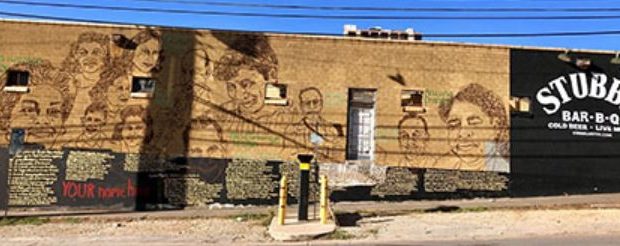Data suggests economic boost from later Red River noise curfews
Wednesday, October 4, 2017 by
Chad Swiatecki With the six-month pilot program giving outdoor music venues on Red River Street later weekend sound curfews set to expire at the end of the month, business owners and city officials are putting together their case for extending the program well into 2018.
An early glimpse at some of the data being collected was available at Monday’s meeting of the Austin Music Commission, with the initial metrics painting the program as having made a positive impact for clubs in the Red River Cultural District.
Brian Block, entertainment services manager for the city’s Music and Entertainment Division, said from May through September the five participating outdoor venues reported a 3 percent increase in ticket sales, a 5 percent increase in staff pay, a 10 percent increase in local and national acts booked and a 22 percent increase in compensation paid to bands over the same time frame in 2016. That data was self-reported and provided to the city by the Red River Merchants Association, with Block noting that there was no way for the city to do a comprehensive audit of that data.
Liquor receipts from the state painted a less-clear picture with some months staying even or decreasing, but the July totals were up substantially, thanks in large part to a four-day festival throughout the district meant to showcase the new, later hours.
Music commissioners were encouraged by the numbers since the program was created as a way to quickly generate more money for local musicians and venues in the district where development pressures are raising property taxes and rents are expected to rise as a result.
City Council is expected to review the pilot program’s effectiveness at its Oct. 19 meeting, with the possibility of extending it another six months. Block said it is likely that further data gathered through the end of the year would allow him and other stakeholders to petition Council to keep the program in place even longer, though he said the exact duration is still to be determined.
“If we’ve got good data and can present that to the various stakeholders to get support of this, we could get it done by the end of the year,” he said. “If we hear some concerns and then have to thread the needle on making a recommendation that balances everyone’s concerns, then we can do that too.”
Block also presented sound and crime impact data to the commission, with sound monitoring and calls for noise complaints showing “no quantifiable or measurable sound impact to the neighborhoods.” Noise complaint calls from nearby neighborhoods were found to not correspond to the sound generated by outside concerts that can last until 1 a.m. on Fridays and Saturdays.
The Austin Police Department reported an uptick in criminal activity linked to the clubs, with a surge of K2 use at the nearby Austin Resource Center for the Homeless seen as the driving factor in a higher volume of criminal complaints.
Block and other city officials are asking residents in the neighborhoods near the Red River Cultural District to take part in an online survey and report how the later sound curfews impacted their quality of life. Small focus groups with neighbors, club owners and others with interests related to the live music industry downtown will be taking place ahead of the Oct. 19 Council meeting.
Kimberly Levinson, vice president of the Downtown Austin Neighborhood Association, said she’s heard no complaints from friends and neighbors about the later hours for concerts since the program started.
Levinson said her biggest concern is making sure the city maintains monitoring and enforcement of the sound levels at outdoor clubs. She said the city also needs to move forward with implementing a properly conceived “agent of change” policy that will keep clubs and neighboring residential developments from possibly putting each other out of business over legal actions from noise complaints.
“Everyone has been on their best behavior, which is good because we need to preserve Austin as the live music capital of the world and we can’t let that part of our identity lapse and get lost,” she said. ”I definitely want to hear that we’ll continue to have solid enforcement, and I’m going to push on the agent of change and the notification provisions. If those two things work, then it all works.”
Photo courtesy of the city of Austin.
The Austin Monitor’s work is made possible by donations from the community. Though our reporting covers donors from time to time, we are careful to keep business and editorial efforts separate while maintaining transparency. A complete list of donors is available here, and our code of ethics is explained here.
You're a community leader
And we’re honored you look to us for serious, in-depth news. You know a strong community needs local and dedicated watchdog reporting. We’re here for you and that won’t change. Now will you take the powerful next step and support our nonprofit news organization?



